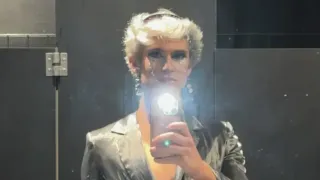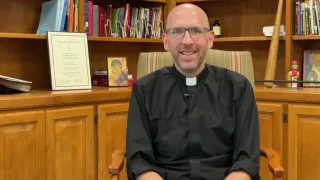January 12, 2015
Fascinating People :: Gary Jonathan Janis
Kilian Melloy READ TIME: 7 MIN.
A good followup to last week's Fascinating Person, Mr Tom Elliott of the "Twilight Zone Podcast," is novelist Gary Jonathan Janis. A resident of Las Vegas, Nevada, Janis is something of a desert flower. Negotiate the twisting plot lines, intense religious atmospherics, and dense symbolism of his books, and you might (or might not) feel you have come to understand them. Even if not, your brain is sure to buzz for weeks.
EDGE: Mr. Gary Jonathan Janis, you are a fascinating guy! You've published two novels I know of, "Paris Green" and, very recently, "Desire and Fear (In the Garden of Something Called God)." Both novels have definite religious undercurrents that make me wonder if you were in a seminary or maybe even a priest earlier in your life. Was that the case? If so, did it inform your fiction writing?
Gary Jonathan Janis: Thank you, Kilian, for this interview and also for declaring me fascinating. You are too kind (and yet very prescient.)
While it is true that I have written two novels containing subject matter that is often mystical, esoteric, and religious, I have never been in a seminary. Nor the priesthood, at least not in the conventional Christian tradition. When I was in my early teen years and twenties, I was deeply devoted to the exploration of occult and Pagan traditions and practices. This was back in the '60s and '70s. Aleister Crowley, who was a nineteenth and twentieth century occultist, poet, and novelist, and who wrote the infamous "Liber AL vel Legis" ("Book of the Law"), profoundly influenced and informed my personal philosophy at that time.
Another significant savage intellectual occult icon who rocketed to fame then was a radical rascal, notoriously vogue during the occult scene of the '60s and '70s, named Anton Szandor LaVey. His great opus is the timeless "The Satanic Bible," and he was the founder of the legendary Church of Satan in San Francisco, which I believe no longer exists. These two figures were conjoined in a formidable constellation of magical luminaries who essentially initiated me into my own priesthood. In the '70s, I became the Grand Master of the Order of the Trapezoid with an intimate following, and appeared three times on a local Chicago TV show called "News of the Psychic World" to discuss Satanism and Witchcraft with the lovely transgendered hostess, Paula Miller.
So, having said all of that, yes, this life-long fascination with mysticism and things religious and occult does influence my writing. Except if it is pure pornography, of course. And, I'm no longer a priest of anything. Simply devoted to the First Miracle of Christ.
EDGE: Your novels do contain some pretty racy scenes! Do you write erotic fiction as a side?
Gary Jonathan Janis: I haven't written pure porno in years. Way before the internet, I used to write porno stories for magazines like Torso and Blue Boy. Two of my acclaimed best sellers were "Randy" and "Steam." I think I still have the originals somewhere. They paid well too!
No one reads porno anymore -- these people want gratification on-demand. Internet video spoiled all that, don't you think?
EDGE: "Paris Green" was a fairly straightforward story about a man who falls in love and thinks of his beloved as an "angel." There is some hint that the guy might actually be of celestial provenance. But "Desire and Fear" is a much more complicated, twisting plot, and it's stuffed with symbols and imagery, some of which seems religious in the contemporary sense of the word and some of which seems like it must have been drawn from pagan traditions, magic, and other occult sources. I hate to be dense... but what is going on in "Desire and Fear?" Is it a retelling of the mythical War in Heaven?
Gary Jonathan Janis: Dios mio! A war in heaven. Actually, it's more about a war on Earth -- the garden of something called God. Something is called God on Earth, but no one knows what that really is. It's often called love, but that is simply a saccharine and very naive trope.
Have you ever seen the films by Alejandro Jodorowsky? Especially "El Topo" and "The Holy Mountain?" Jodorowsky is a visionary mystical philosopher who also happens to be a filmmaker. He bestows his mystical apprehensions upon us through this medium with a rarefied �lan that can only be truly appreciated by observers who have a fluency in this vocabulary of, what I call, transcendental language. The filmmaker, David Lynch, an acolyte of Jodorowsky, is a provocateur who too pronounces his surreal evocations in this meta-language. "Desire and Fear" is my homage to both of these high priests of the dream temple.
I have been told that "Desire and Fear" is an underdeveloped, overly complicated pretentious puzzle. But if a reader looks carefully at how specific words and symbols and actions are placed and occur throughout the story, the reader will encounter a perfectly complete revelatory mystical mosaic like that of a Vedic mandala. Too, if the reader possesses a familiarity with the works of mythology and of writers as T.S. Elliot, William Boroughs, Aleister Crowley, that will advantage him or her. I am not interested in dictating to anyone what I believe the story says or portends. But wouldn't you love to see either Jodorowsky or Lynch take it up as their next film project?
EDGE: One certainly does get the impression, from reading your fiction, that you are a very religious person -- not necessarily in the Christian sense, but still you seem to have a profound spiritual sense.
Gary Jonathan Janis: "I am an atheist. I am a homosexual. I am an alcoholic. I could be a saint and still be any of those things." Who said that? Truman Capote, methinks, and I simply can't agree more! What I am is not religious; I detest religion, most specifically the three Abrahamic ones. These religions, as Christopher Hitchens once deliciously alleged, "poison everything." However, if removed from their traditional miasma of mismanagement, and embraced in personal, mystical appreciation, any one of these three can take on a luster that may be vivifying. So I will say that I am a Sam Harris atheist.
The troubling fact about these religions is that it is almost impossible to disabuse their followers of the memes of abject stupidity that issue forth from the pages of their holy books. Here's one for you: Gay men must be murdered! Of course, it says nothing about gay women. Ha! One saving grace is that nothing is mentioned about homosexuality in either the centerpiece of the Old Testament, which is the Ten Commandments, or the centerpiece of the New Testament, which is, of course, the gospels.
EDGE: You have a husband, which religious sorts view as a sacramental relationship. Did you ever have a conflict between being gay and being a spiritually inclined person? What advice do you think you might have for religious gay people, especially kids living in religious communities with faith-based homophobic outlooks?
Gary Jonathan Janis: I do have a husband. I do hate using that word; it's so heterosexual, but alas, I won't call him my wife. We've been together for about 20 years. We were married last year in Palm Springs, California. And now it's legal here, in Nevada, where we live. Who would ever have thought?
I have never been conflicted about being gay. My "religious" convictions came to me from studying occult philosophies, as I have said, and that was liberating. I am an only child; my parents were closet atheists, and so I never had to deal with the abuse of religious stupidity when I was young. I came out to my parents in 1974, and even though this was in a religious-free zone, it didn't go well at all. They came to an eventual enlightened understanding of my sexual orientation a few years before they passed away. My mother actually wished that I could have been on a TV show like "Queer Eye for the Straight Guy," and she admonished me for not being gay enough! I can't sew, arrange flowers, or do hair. What a world. So I write! And my advice is: It does get better.
EDGE: Aside from being a writer, what profession or professions have you pursued?
Gary Jonathan Janis: My father was a mortician, and had he been an entrepreneur and opened his own funeral chapel, I have no doubt that I would have become a mortician. What a lovely occupation: Your clients don't talk back to you, and everyone is just dying for your work.
Most of my adult professional life though has been as a technical writer. I've worked on nuclear projects and in counterintelligence for the government; mostly rather bureaucratic and banal. Nothing as steamy and mesmerizing as the work of Edward Snowden.
EDGE: Tell me about this photo you've provided, of you smoking in a bar... even though you're not a smoker...
Gary Jonathan Janis: That photo was taken during a project that I did back in the late '70s in Chicago. It was what I called a "paralyzed film." It consisted of 40 8x10 back and white photos on the El and in the subway of a "possible" rape and murder of a women (who was played by a transgender friend of mine). It was called "Subway Submission." It hung for a month at the Chicago Gay Film Center. Yes. It looks divine; just like moi!
EDGE: What new projects are you working on?
Gary Jonathan Janis: Talk about a story with a religious conviction. I'm writing a very long short story, a la "Damage" by the great Josephine Hart, about a ravishing Catholic nun in her early thirties, who is also a Ph.D. in psychology, who is counseling a newly ordained priest in his late twenties, who is having a problem dealing with chastity. They eventually have an affair that leads to her becoming pregnant; the d�nouement is, that while she is having an abortion, he commits hara-kiri. It's called "The Glamour of Evil." What more can you ask for, n'est-ce pas?






